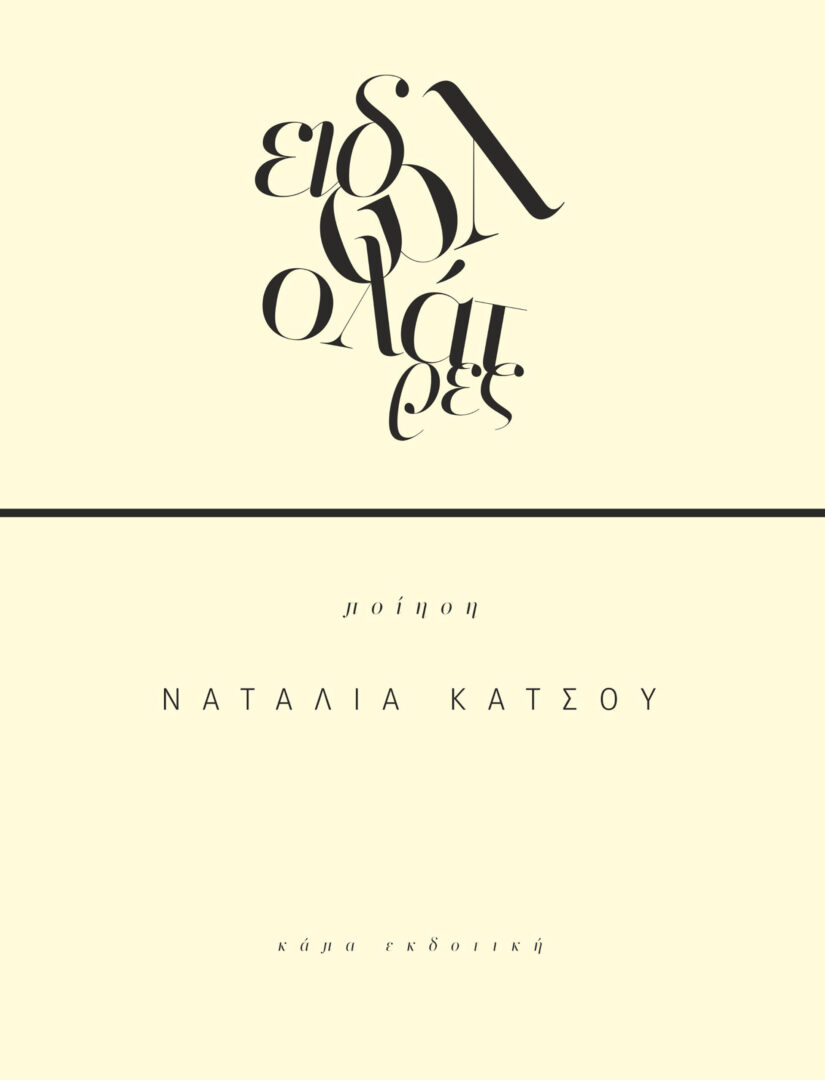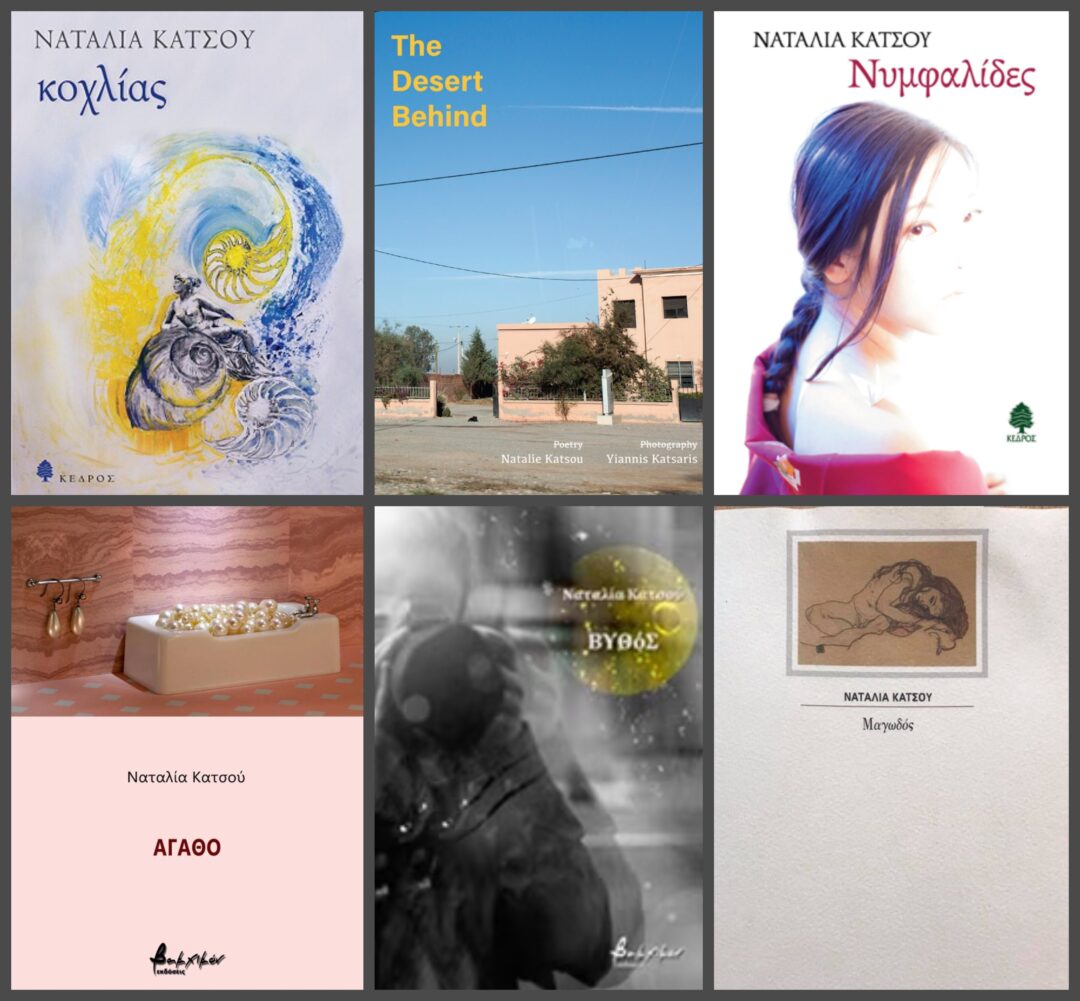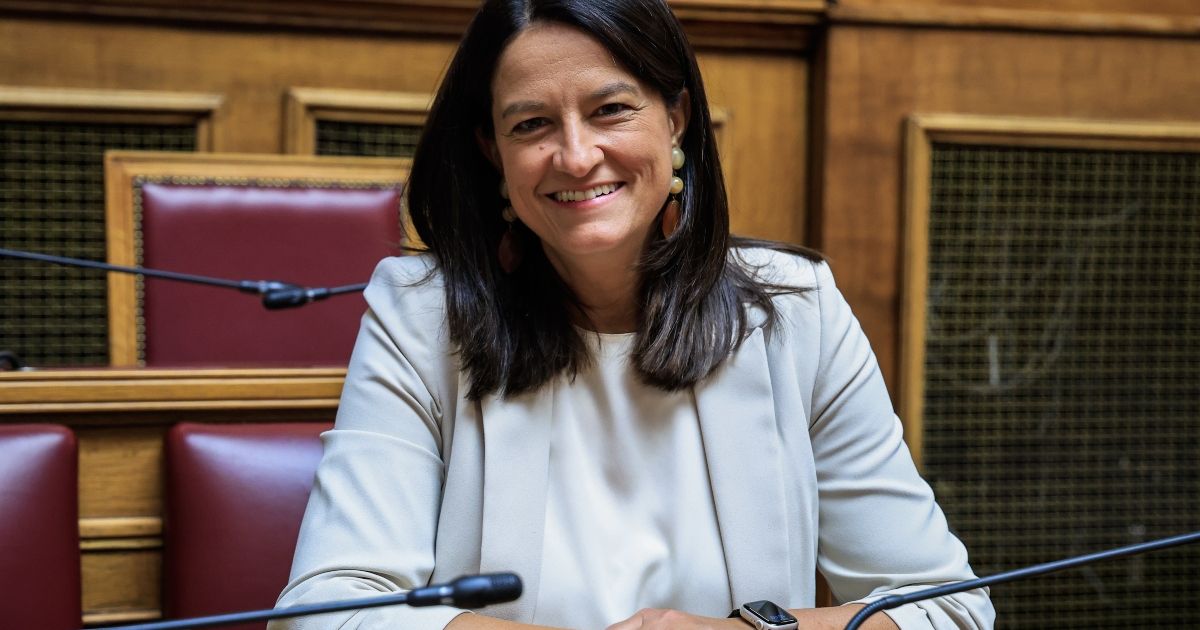Natalie Katsou is a theatre and performance lecturer, a director and a writer. Natalie studied Law (BA) and Theatre Studies (BA) at the National and Kapodistrian University of Athens and she completed her acting training at Delos-Hatoupi Acting School. She had her Master of Fine Arts (MFA) in Theatre Directing at East 15 Acting School (Alexis Minotis Scholarship by MIET) and her PhD in Philosophy and Theory of Theatre and Drama at the aforementioned University of Athens.
 © Yiannis Katsaris
© Yiannis KatsarisShe teaches acting, dramaturgy and critical studies, as well as Art Law at Goldsmiths, University of London. Her research focuses on spectral readings, heterotopias, intermediality, and migration with publications across acclaimed academic journals. Her first theatre play, The Wedding Dress, was selected and presented for the Empty Space at the National Theatre of Greece under her directing (2006). She has since published four plays and directed various new writing, tragedy and opera in Greece and the UK, as well as internationally, including Turkey and Hungary. She is the co-founder and artistic director of En Spoudi Theatre Company (Athens, 2006-09) and Operaview (London, 2014-17).
Natalie has published five poetry books, including Magodos (Kastaniotis 2008), Cochlea (Kedros 2012), Nymphalidae (Kedros 2016), Eidololatres (Kapa Publishing House 2019)), as well as the photography/poetry bilingual book The Desert Behind with photographer Yiannis Katsaris (limited edition 2019). Many of her poems have been translated in English, French, Italian, and Spanish in print and for online publications.
A poet, a playwright, a director, a performing arts practitioner. Where do all these attributes meet? Could language, in its various forms, hold the binding thread?
I always find it intimidating to put together a fuller picture of what I do and who I am in a concise way. Putting together a biog is often a provocation, it can trigger an identity crisis and it sends impostor chills down my spine. So, thank you for addressing this right at the front in a way that feels compositional.
Language, indeed, is a very important element that can hold all these different ways of creating together. Greek language has undoubtedly shaped the way I think and speak. From the open vowels and this relishing of sounds to the complex syntax and the obsession with etymology, Greek is the core of my worldview. Who can resist this absurd freedom that is available in this double meaning that most things Greek can have? The ancient ambiguity brings in extra charm, even if someone is totally oblivious to it. Ironically, we’re now discussing in my second language, English, a language that I chose as a habitat and a culture in which I’ve been ‘naturalised’ – per legal terms too. Bringing the two together becomes a litmus test between a fully gendered language, where words are constantly bound to time and disposition, and a language that is bound to a certain beat, where the vocabulary marks technical terminology worldwide. However, English is not beating the pace of business only, it is, of course, a language for great poetry and theatre.
Thinking of language as a wider concept, I would say that the response, the reaction, and the interaction, play a very important part in all the attributes and areas of my work. Perhaps this game of invitation/provocation/curation becomes even more prominent for me in these times. There is fundamentally an agony for connection, an effort to bring something in a shared space with others -that’s what ties the different strands of creativity and production together in my work. Writing forms a more protected, controlled and self-sufficient way of expression, it starts from a more personal and solitary place and it is offered as a starting point or a stand-alone for consumption; rehearsing or facilitating a theatrical process on the other hand, stirs a different kind of conversation, it creates the space for a more participatory and less verbal language, it is a constantly-evolving language that depends primarily on different minds and bodies, it is a riskier, often transient and absolutely thrilling place to be in.

In his review of your latest poetry collection Ειδωλολάτρες, Vangelis Hatzivassileiou commented that among the main topics your poetry touches upon is the emergence of the geography of the body and the senses, as well as an almost cryptic description of a society that limps on all levels, sweeping both our individual existence and the social structures in which we reside. Which are the main issues your poetry delves into? How has your poetic writing evolved from one collection to the next?
I found the reading of Mr. Hatzivassileiou particularly insightful – as expected, for such an experienced literature professional – and this particular point gave me great courage. Social issues and cultural pathologies creep into my work – I’d like to believe- since my first writings. However, it is true that Ειδωλολάτρες (Idolaters) were particularly prompted by a series of shocks I experienced simply by observing the world around me and by taking more detailed notes from the news. What started as an internal query on my position and my role as an artist in a bilingual, multicultural, controversial reality, soon became a quest, a duty to report on some specific events that became strong paradigms of the different crises. As the book progresses, especially in the last chapter, ‘Albion’, I felt compelled to make room for the voices of people that are cast aside or are put under insidious light. All the poems are sparked from specific events, yet the poems evolved from my imagination alone, I do not claim this to be a research project. My theatrical devices sent me to travel into hypothetical encounters. This means that I gladly left the observation of the self, or of the world through the self aside and focused on bigger pictures that include islamophobia, violence, Grenfell Tower, the camp at Calais and forced migration. These pictures do not include me directly, yet they affect me deeply and I believe I play a part into how they are shaped – we all do.
It requires extreme clarity and selflessness to be able to trace one’s own evolution in poetry. It also requires reading and re-reading your own work – which is something I passionately avoid; I only indulge in that exhausting self-reflection when asked to select poems for a reading or an anthology.
I believe that I’m at a stage now where I can let go of many things that I obsessed about in the past and that I can finally see what ‘your poetry is stringent and complicated’ might mean. The latter comment, received multiple times, can be quite hurtful -and undecipherable. The ‘complicated’ element mostly sounds like an excuse to lower the stakes, yet I can identify it –that definitely doesn’t mean that I’m willing to write things in a simpler way that can be ‘easily digested’.
A couple of elements that I think are constant in my work is the use of myth, the concept of a composition for each book (rather than a harvesting/collection of poems), and the fatal attraction to what one could call ‘cryptic’ (as very aptly put in the review you quoted). None of this is intentional, except perhaps the stubbornness to experiment with form and structure, which crops up in my theatre writing as well. In terms of ‘topics’ or ‘areas’, one wants to believe that each book is different, yet each writer probably keeps writing the same book, as Derrida noticed. Certainly, our bodies, how they look, what we do with them and what this means, is a constant challenge in my books. Also, how can language get us a seat in the world, (can it?), how can we secure belonging, connecting, and disrupting through words and speech? Another theme is time, rather breaking the time continuum and escape the aporia, blending antiquity, tradition and a surreal sense of ‘here now’. Last but not least, I think that justice, in the form of ethical dilemmas, institutional obstacles, gender and other constructs, or simply through social/cultural isolation, shadow my work.
What role does the use of myth in a contemporary context serve in your poetry? What purpose does the use of a surreal poetic language serve in this respect?
Myth appeared to me as a world that one can enter, but that was much later.
As a child I had associated the abridged versions with the cartoonish illustrations ‘for children’ to a special kind of folklore that did not suit me. I re-discovered myth through learning Ancient Greek at school – and that is also how both the poetic and the dramatic inscribed in me. However, I had never thought I would be ‘using’ myth in my writing, it wasn’t a linear ‘good student syndrome’, quite the opposite. I didn’t set out on a mission to add to any re-imaginings or re-tellings of myth and I certainly did not use it as a metaphor. If anything, I’ve always found the conviction of the ancient Greek lineage quite a disturbing and strange solace.
My relationship with myth grows mainly as a live conversation with stories that I find enchanting and figures that seem oddly familiar (almost in the sense of the spectral unheimlich/unfamiliar). A desire to be there and be (in) that story – which, in hindsight, sounds a lot like a theatrical process. At the same time, that world feels very real and inseparable from pieces of history where language is precious and multi-dimensional, an ancient world that survives through fragments, through places, objects and stories, yet remains intangible. Interestingly, in Cochlea, I used the word ‘fragment’ (fragmentum) as a title to organize a series of observations from a hypothetical contemporary finder, a journalist or an archaeologist that catalogues the emerging pieces through the story, who can never quite grasp the full picture. This was a spontaneous choice of word, I was not as familiar with Benjamin’s vocabulary then. What I also did not know, was that myth would become such a characteristic component, a strong basis for my work in poetry. The ‘ghosting’ effect (per Marvin Carlson) of mythical references is, of course, unavoidable: once someone sees a name or a plot that relates to a myth, they cannot unsee it, they cannot unsee that hero, god, or tragic human that is vested in the words. All readings are seeking to confirm that this myth is (still) there, whilst our everyday, rational brain tries to connect this with things we do know. Is Pasiphaë in Cochlea Minoas’ wife only? Or, how many women that we know (and are) are included in that new, fictional queen? Is Narcissus in Idolaters just the boy who mistook his image for another? (Is it me imagining myself as a young man?)
This experiment with a constantly evolving language, the daring of history and our accumulated perceptions, the irony towards contemporary experiences can lead to some fascinating experiences from a reading, but from a writing perspective as well – all within the poetic universe, hopefully.

“Poetry is not a cave that isolates us from the world, but a wave that throws us right at people and things, hoping to lead them to something brighter”. How does your poetry converse with the world it inhabits? Could poetry be used to imagine what could potentially be radically different realities?
In one word, yes, absolutely. Poetry has been used to imagine different realities – as has theatre, film and art. As a provocation, I would say that even the most descriptive, naturalistic, formulaic poetry invites us to imagine a different reality – or the future. Altering the way language creates meaning is a first intervention. Then it’s about form and content too, or form as content. The analysis by Cornelius Castoriadis on the dynamic scheme between individual imaginaries and social/historical collectives can perfectly be exemplified by poetry. What is offered through poetry affects our response to micro- and macro-situations with a long-term imprint The poetry-way-to-reality is done in radical and less radical ways, although one could argue that choosing to work as a writer (or any kind of artist), is already radical, it already shows a different reality.
Going through a speedy retrospection, I would observe that in my first book there is a strong need to discover the self and express aspects of my relationships to things that are significant to me. The question between what one shows and what one hides felt critical at that point and it has formed a backdrop for most of my work since. However, moving further from this umbilical almost observatory, the question can shift towards what one sees and what others see, which includes wider questions beyond the specific and the individual. For example, in Nymphalidae, a book quite dense, the different perspectives around the same heroine form a discussion around cultural barriers, historical perspectives, and gender dynamics. These topics return to all my books, and especially in Idolaters, the concern about the constantly fluctuating and compromised view we have on things, the way we consume, absorb or are absorbed by information is growing, in conjunction with questions around writing, aesthetics/poetics and my own place in the worlds I inhabit.
Your theatrical plays constitute a successful example of experimentation away from traditional forms. What purpose does this experimentation serve?
As mentioned, experimentation is a strong moving force in my work. Experimentation for me is essentially a mixture of curiosity and playfulness, together with the pure enjoyment of writing as practice, as a physical way of being/doing.
The wealth of writings in theatre and poetry – and for a good part, their quality – can be intimidating. Especially in the era of de-humanities, where arts, books and non-technocratic sciences are largely scorned, devalued and under-funded, writing and expecting to be read can seem redundant. However, there is tremendous space to be created and re-structured through writing, so many encounters, struggles and changes to be achieved. Theatre and poetry are constant projects/projectors. They reflect what is here now and they shape possibilities ahead. Looking for a different way to say the same thing, employing a different medium, genre, or language, or jumping from verse to soliloquies is a freedom and a compelling passion to share that freedom, to share ideas – ideas that are profoundly influenced by that adventure and practice. Wasn’t Borges who said that each writer constantly writes the same book?
How does Greek art converse with world artistic trends?
This is a fascinating and challenging question – and one that would form an interesting PhD thesis. Greece has always been a very positive vessel and a mirror of the movements and currents that develop around it, especially those coming from the West –the Mediterranean and Europe in general, but also a more ‘Universal’ view, which usually includes the States and different communities from the Latinx South. This quest to assimilate with prosperous cultures of the West haunts Greek history since the establishment of a modern state, and it seems to transpire to all forms and eras since.
In theatre and in poetry alike, I have the impression that Greek creators reach out with an impressive intensity, they reflect other cultures whilst reflecting on their culture. However, I find that there is a lack of balance in that dialogue with the other, the foreign and the ‘global’, as you put it. This effort for a creative conversation is not mutual, it often all literally ‘sounds Greek’ to the areas outside of the Greek-speaking communities and it does not travel far and wide. So, the obvious obstacle is language, the barriers of costly translations and the lack of investment to resources that would allow Greek artists to compete with international creatives. I would say that Greece imports much more than it exports in terms of artistic products and creative trends, or even names and creators as brands. And I’m using commercial terms intentionally, because there seems to be a misunderstanding around the ‘professional’ aspect of art and an audacious neglect towards culture that often simply leaves Greek art – poetry, theatre, literature, so art that is primarily language-dependent – to the margins.
All this sounds like mundane generalisations, of course, as we are sacrificing the intersections and the care for the specific to approach Greek art as a unified big whole. It would be very interesting to dissect this to smaller discussions that run amongst creatives from different art/writing veins and with different experiences. And such initiatives and podiums often open during Book Fairs and Festivals, where the context is more inviting, collective and optimistic than solitary reflection. I’m certain that my experiences are shaped by the distance / overview and the linguistic isolation / multi-lingual survival mode that I’ve carved for myself. And they probably are very different to the experiences of a poet or a playwright that lives in Greece currently or from the experiences of an editor that works in Athens using multiple translation tools to incorporate a new piece to the contemporary Greek landscape – the writing landscape and the readership environment too. Or, perhaps, the experiences of a translator somewhere that tries to bring a Greek piece of work to the wider world in another language?
*Interview by Athina Rossoglou
INTRO PHOTO ©Yiannis Katsaris
TAGS: LITERATURE & BOOKS | READING GREECE

 4 hours ago
6
4 hours ago
6








 Greek (GR) ·
Greek (GR) ·  English (US) ·
English (US) ·